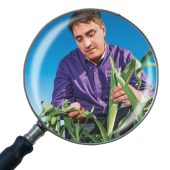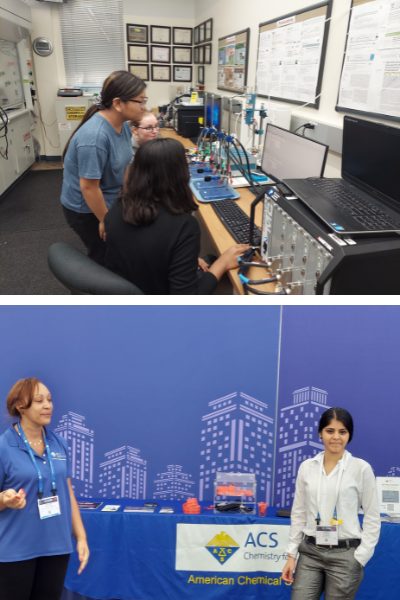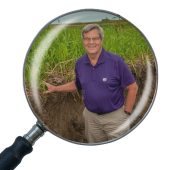Meet the Researchers
Kansas Corn is committed to funding research projects that promote innovation and sustainability of the corn industry. Scroll through the profiles below to learn more about the research we fund and the people behind it making the magic happen.

Dr. Alan Allgeier
Associate Professor, The University of Kansas, Chemical and Petroleum Engineering
 Q: Why did you decide to pursue a career in research and how does corn research fit into your career?
Q: Why did you decide to pursue a career in research and how does corn research fit into your career?
A: Teachers! Like so many my trajectory was influenced by great science teachers. Mr. DeSantis encouraged me to do experiments even in elementary school and pointed out the window in spring and said, “Now is a great time to start experimenting with plants.” I grew up in rural Pennsylvania and was active in the PA Junior Academy of Science. Plant growth and water analysis captured my early attention but ultimately I found chemistry and have been hooked since. My research focuses on sustainable manufacturing of chemical and materials using catalysts and biotechnology. In most cases we are focused on making every-day products like plastic packaging or paints and adhesives from agriculture not petroleum. We are particularly interested in “the next ethanol”, that is what can we make from an ethanol plant beyond transportation fuel?
Q: How does a Kansas farmer benefit from your research?
A: We are seeking big inventions that will turn corn and ultimately corn stover into high value chemicals. When we are successful there will be an increased demand for corn. We are especially interested in technology that could be easily adopted by existing ethanol plants to facilitate transfer from lab to reality.
Q: How has the Kansas Corn Commission given you the ability to find answers to production concerns for Kansas farmers?
A: I don’t think our research directly addresses farm production concerns but it should boost demand for corn.
Q: How would you describe your research project(s) funded by Kansas Corn?
A: Corn ethanol is the most advanced biofuel in the United States but it certainly has challenges as production increases outpaced demand in the last decade. We saw that problem and said “What else can we do with ethanol?” The chemical acetaldehyde is already a valuable product in the production of polymers found in paints, adhesives and many industrial products. The markets are already established and the selling price is double that of ethanol and growing at six percent per year. With funding from the Kansas Corn Commission, we are developing a process for producing acetaldehyde from ethanol that relies on biotechnology processes invented at KU. The process works in water at low temperatures and should be readily adopted by ethanol producers, increasing the sales and, importantly, demand for corn.
Q: What is the next step or phase of your research in this area?
A: As engineers, we spend significant effort not only proving technology works but proving that it can make a profit (technoeconomic analysis). We have made great strides in our research from its beginning until now by replacing unprofitable options with more desirable process conditions. A challenge for our process is that it still requires dilute ethanol. A corn ethanol plant may produce 12 percent ethanol by weight but we are currently limited to under one percent. We need to improve our biocatalysts to handle the higher concentration of ethanol and then work with our partners to demonstrate the technology under conditions of an operating corn ethanol plant.
Q: How do you believe Kansas corn farmers are playing a part in a more sustainable future, either through improved farming practices or corn-based products?
A: Sustainability is at the heart of research at KU that aims to make every day products from agriculture. Today most of the world’s acetaldehyde is produced from coal or petroleum. We expect that producing it from corn would reduce greenhouse gas emissions and improve the sustainability of chemical processing, and there’s an even brighter future to envision. Once we are successful with acetaldehyde, we can convert it into even more valuable products including butadiene that could boost demand much more and further reduce fossil fuel utilization. While we’re working on our part, we also celebrate our expert colleagues in the agricultural sciences. Research on drought-tolerant corn and reducing farm inputs while maintaining yield are especially important in the overall sustainability of our research … so Go Team!

Dr. Ignacio Ciampitti
Professor, Kansas State University, Agronomy
 Q: Why did you decide to pursue a career in research and how does corn research fit into your career?
Q: Why did you decide to pursue a career in research and how does corn research fit into your career?
A: I grew up in Buenos Aires, Argentina, and early during my childhood I was in contact with agriculture during my summer times. My passion to do research and help famers started early on in my life. My passion for corn research started when I understood the importance of the crop and the impact on the food production system.
Q: How does a Kansas farmer benefit from your research?
A: The mission of our team, Ciampitti Lab, is to foster excellence in research and service, devoted to innovation and focused on integrating new technologies and data science for improving the overall prediction of the behavior of farming systems with the emphasis on farmers. As for potential recommendations, our team strives to provide recommendations considering profitability as a main factor. Within this context, we believe that managing the agricultural farming system (e.g., considering plant density, nitrogen fertilization, water use) is critical for sustainable corn production. Our team is working on transforming critical research in decision support tools to help our farmers across the state when taking management actions.
Q: How has the Kansas Corn Commission given you the ability to find answers to production concerns for Kansas farmers?
A: The Kansas Corn Commission provides critical support to fund our applied research initiatives. This source of funding coming from farmers is essential so our team can advance knowledge and help to solve the production concerns for Kansas corn farmers.
Q: How would you describe your research project(s) funded by Kansas Corn?
A: Our research objective is to communicate new findings, provide academic coordination to the Kansas Corn schools, lead innovative applied research topics, and facilitate the dissemination of new information to assist key-stakeholders more effectively for fostering profitable and sustainable corn systems.
Q: What is the next step or phase of your research in this area?
A: Our research efforts range from developing new decision support tools for deciding optimal plant density, water and nitrogen as the main inputs for corn production across the state. One example on the use of probabilistic and dynamic models has been recently presented in our K-State Agronomy newsletter, eUpdate article, related to the decision of adjusting corn seeding rates based on the current soil water conditions and projected weather for the 2022 season (adjusting corn plant density). Our team is continue efforts on advancing dynamic decision models for farmers and exploring potential improvements in the use of inputs and resources for a sustainable corn production system.
Q: How do you believe Kansas corn farmers are playing a part in a more sustainable future, either through improved farming practices or corn-based products?
A: Kansas corn farmers are playing a critical role on advancing a more sustainable agricultural farming system, adjusting inputs, increasing the efficiency on using water and nutrients, exploring crop rotation and implementing conservation practices such as cover crops, and no tillage systems, as a few options.

Dr. Ram Gupta
Associate Professor, Pittsburg State University, Chemistry (Kansas Polymer Research Center)
 Q: Why did you decide to pursue a career in research and how does corn research fit into your career?
Q: Why did you decide to pursue a career in research and how does corn research fit into your career?
A: I am a problem solver. While growing up back in India, we struggled to have electricity all day. Many of us were using an emergency power supplies, meanwhile the gas-operated emergency power supplies polluted the environment and battery-operated were not efficient to provide energy for a long time. That was the moment I decided to solve this problem by researching efficient and environmentally friendly ways to produce and store energy. To provide a clean environment for the coming generation. I also decided to use renewable resources for the fabrication of energy devices such as batteries and supercapacitors and provide an alternative option to petrochemical-based chemicals for the preparation of commercially important polymers such as polyurethanes.
Q: How does a Kansas farmer benefit from your research?
A: My research involves the use of corn-based materials for commercial applications. For example, we are using corn oil for polyurethanes, lubricants, and biofuels. These industries are among the fastest-growing industries which can generate a demand of over 8, 50, and 150 billion corn bushels, respectively every year. Another blooming area is energy storage devices. With the rapid development of electric vehicles and growing demand for efficient energy devices, it is projected that the global battery market will grow at a rate of 14% from 2020 to 2027 with current value of over USD 100 billion. About 200 thousand metric tons of carbon (graphite) are expected to be used in 2022 for battery industries only and demand is expected to grow significantly. Such carbon can be prepared using biowaste generated in corn crops. Even to meet the current demand, over 120 million corn bushels will be required. The value-added applications of corn-based materials will generate more demand for corn and will benefit Kansas corn growers.
Q: How has the Kansas Corn Commission given you the ability to find answers to production concerns for Kansas farmers?
A: The Kansas Corn Commission is supporting our idea and providing research funds. These funds are not only helping to advance our research but also providing financial support to our high school, undergraduate, and graduate students. The fundamental knowledge and advancement in technologies generated from this support are expected to attract renewable materials-based manufacturing in Kansas. Such effort will ultimately increase the demand for corn-based materials for value-added applications.
Q: How would you describe your research project(s) funded by Kansas Corn?
A: We are using corn-based materials for industrially important produces such as polyurethane foams, lubricants, biofuels, batteries, and supercapacitors. We are using corn oil for the preparation of polyurethane foams, lubricants, and biofuels. The biowaste generated by corn crops is being used to fabricate high-performance energy storage devices.
Q: What is the next step or phase of your research in this area?
A: Our next step is to further improve the performance of batteries/supercapacitors so that they can meet the industrial standard and growing demand for high energy and power density. Our research is also focused on further improving the properties of biofuels prepared using corn oil.
Q: How do you believe Kansas corn farmers are playing a part in a more sustainable future, either through improved farming practices or corn-based products?
A: Corn-based materials such as corn oil and biomaterials generated after harvesting are being used for the production of commercial materials such as polymers, lubricants, biofuels, and batteries. The use of renewable resources for such industries will reduce the burden on fossil fuel-based chemicals and provide an alternative routes for such materials while keeping the environment clean. The support from Kansas Corn Commission is also helping to educate many students, including students from minority groups. These students are learning new processes for manufacturing industrial products via sustainable routes.

Dr. Sunghun Park
Professor, Kansas State University, Horticulture and Natural Resources
 Q: Why did you decide to pursue a career in research and how does corn research fit into your career?
Q: Why did you decide to pursue a career in research and how does corn research fit into your career?
A: Overcoming food shortages through self-reliance and sustainable agriculture is a major goal worldwide. I was interested in pursuing this challenge to overcome food shortages through genetic transformation and genome editing techniques as a corn molecular breeder/biotechnologist. Corn is one of the most widely grown crops in the world. Kansas corn production is also important for industrial uses, food production, feed for animal production, and most importantly jobs for Kansans.
Q: How does a Kansas farmer benefit from your research?
A: The results of my research will significantly impact corn production of farmers in Kansas by providing genetic tools for corn breeders to develop heat and drought stress tolerant cultivars.
Q: How has the Kansas Corn Commission given you the ability to find answers to production concerns for Kansas farmers?
A: The funds from Kansas Corn Commission have allowed us to produce realistic production models for corn improvement under combined heat and drought stress.
Q: How would you describe your research project(s) funded by Kansas Corn?
A: My goal of this research project is to translate a novel stress-response gene GRXS17-mediated bioengineering technology into reducing the vulnerability of Kansas corn producers to high yield losses due to combined heat (daytime and night-time) and drought stress of their crops and subsequently to improve water management and efficiency.
Q: What is the next step or phase of your research in this area?
A: In previous studies funded by the Kansas Corn Commission sponsored research program, we have showed that GRXS17-expressing bioengineered corn plants display more tolerance to heat and drought stresses in corn and increase yield compared to wild-type plants. However, heat (daytime and night-time) and drought stresses often come together, affecting significant economic loss to Kansas corn farmers. This work will significantly impact corn production of farmers in Kansas by providing genetic tools for corn breeders to develop both heat and drought stress tolerant cultivars and potentially improve water management. As the next step, our current pilot trial of this study will be translated and evaluated as larger scale performance under field conditions at several different locations, and we will produce realistic production models for corn improvement and effective water usage in Kansas.
Q: How do you believe Kansas corn farmers are playing a part in a more sustainable future, either through improved farming practices or corn-based products?
A: I believe that corn yield in Kansas has been on a steady increase due to genetic improvement and improved cropping techniques. Kansas corn farmers’ continuing support and utilization of our research products will pave the way for further development of elite corn plants, such as enhanced heat (daytime and night-time) and drought stress tolerance corn, contributing to ameliorate the consequences of future weather disasters that are likely to increase in frequency due to anticipated climatic changes.

Dr. Chuck Rice
Professor, Kansas State University, Soil Microbiology
 Q: Why did you decide to pursue a career in research and how does corn research fit into your career?
Q: Why did you decide to pursue a career in research and how does corn research fit into your career?
A: I grew up loving science. When I went to college, I started as a biology major. However, when I took a water science course, I switched to physical geography, which contained soil and water sciences. I had a summer internship at Argonne National Laboratory working on the reclamation of surface mine soils. I went to the University of Kentucky for my Master’s and Ph.D. For my M.S. I worked on reclamation of strip-mine lands. My Ph.D. was in soil microbiology, conducting research on one of the oldest no-till experiments in the U.S. I researched all aspects of the nitrogen cycle in no-till corn systems. When I arrived at K-State in 1988, I received a grant to research nitrogen leaching in corn. I started an experiment with no-till corn with different nitrogen sources; no nitrogen, commercial fertilizer nitrogen, and manure/compost. This experiment was initially a three year experiment, but I have continued it, and now 33 years later, I’m still learning new things about soils in no-till systems. Our group has also researched nitrogen sources for N use efficiency, including biologically fixed nitrogen for corn. Most of my experiments at K-State have involved corn in rotation with other crops. Corn is a critical crop in the rotation because it provides large amounts of biomass that is returned to the soil, thus protecting the soil, sequestering carbon, and improving soil health.
Q: How does a Kansas farmer benefit from your research?
A: Kansas farmers benefit from my research in several ways. 1) Understanding the no-till system for corn, which includes managing nitrogen fertilizer for efficiency. 2) The benefits of corn for improving soil health and sequestering carbon in the soil. 3) By improving soil health, we improve the soil’s productivity and reduce the risk to weather variability. As organic matter increases, water retention also improves, and soil erosion decreases.
Q: How has the Kansas Corn Commission given you the ability to find answers to production concerns for Kansas farmers?
A: Kansas Corn Commission has been critical to supporting graduate students to collaborate with farmers in their fields to change management practices to improve soil health. Because of checkoff funding and working with Kansas corn farmers, we have learned practical management changes and identified key soil health measurements to share with other Kansas farmers.
Q: How would you describe your research project(s) funded by Kansas Corn?
A: Our research project funded by Kansas Corn is to conduct on-farm research to implement a change in management practice that would improve soil health. For this research, a farmer uses his or her current practice and a new practice in a replicated strip trial experiment. We measure changes in soil health properties over a five year period. In addition, we are collecting yield data to do a cost and benefit analysis for improving soil health.
Q: What is the next step or phase of your research in this area?
A: There are two future steps. One is to continue to track the changes in soil health over a decade rather than just a few years. I would love to start a soil health network across the state of Kansas. This would show farmers the benefit of practices and their profitability. It would provide more local information for the farmers surrounding that network site. The other need is to implement cover crops in western Kansas, if possible, and identify other practices that would benefit soil health in a more semi-arid environment in western Kansas.
Q: How do you believe Kansas corn farmers are playing a part in a more sustainable future, either through improved farming practices or corn-based products?
A: Kansas corn farmers can improve their sustainability by improving soil health. Not only are we sequestering carbon to improve soils; this also improves rainfall infiltration and retention. As we improve soil organic matter, we also improve nutrients, thus, we improve nutrient use efficiency. Greater water and nutrient efficiency translate to increased sustainability and farmer profitability.
